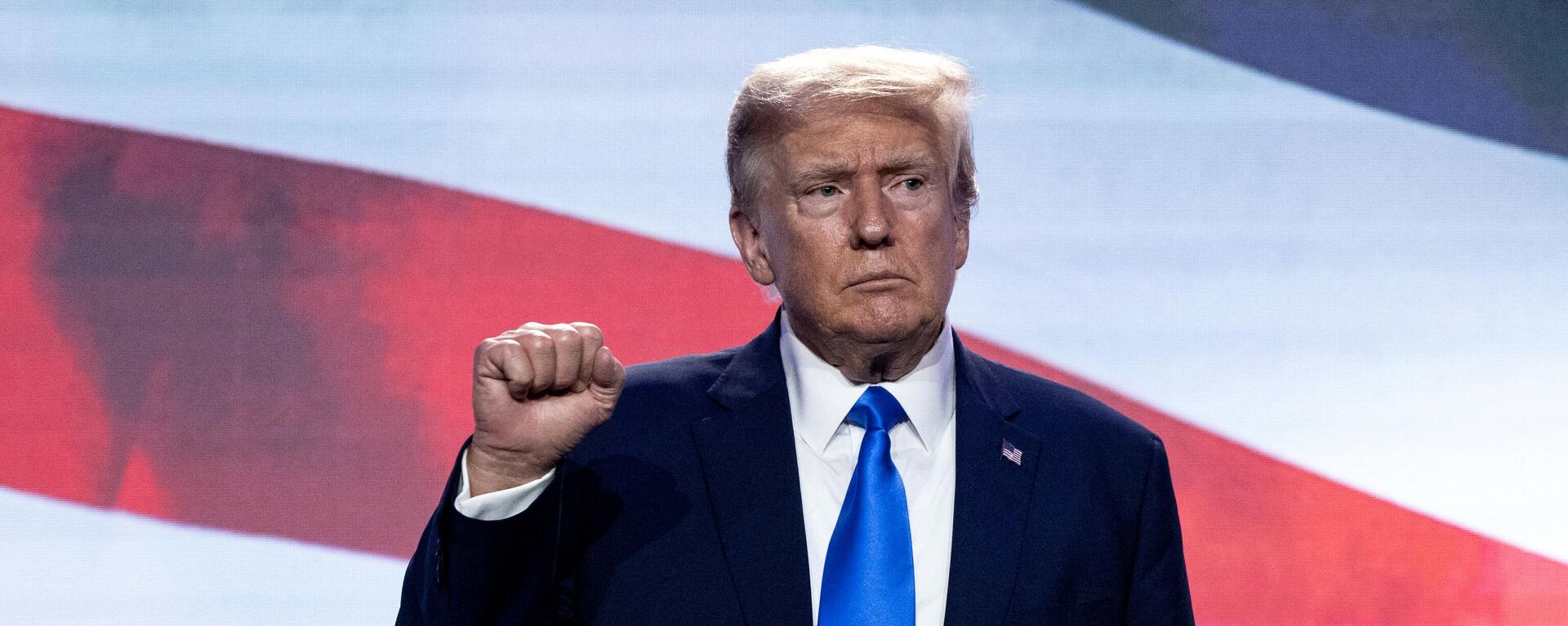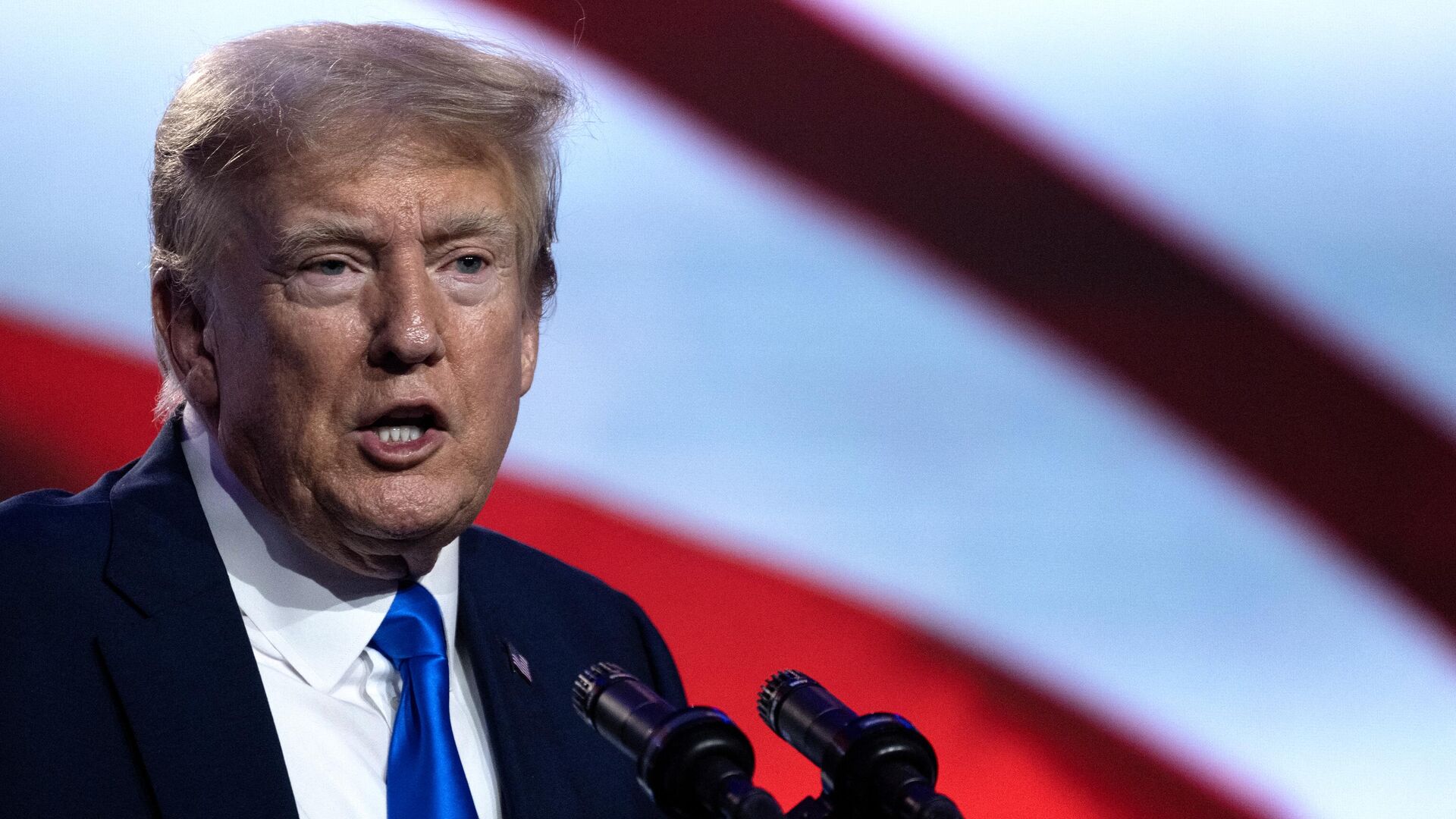https://sputnikglobe.com/20231016/trumps-strategic-delays-risk-upending-federal-trials-casting-shadow-on-legal-future-1114219708.html
Trump's Strategic Delays Risk Upending Federal Trials, Casting Shadow on Legal Future
Trump's Strategic Delays Risk Upending Federal Trials, Casting Shadow on Legal Future
Sputnik International
In a recent motion, Trump suggested postponing his May trial related to the Mar-a-Lago documents case until mid-November 2024, effectively after the next election.
2023-10-16T02:13+0000
2023-10-16T02:13+0000
2023-10-16T02:13+0000
americas
us
florida
cia
donald trump
supreme court
2024 us presidential election
https://cdn1.img.sputnikglobe.com/img/07e7/09/11/1113428342_0:160:3072:1888_1920x0_80_0_0_b958bdd39e01720e36374eaf642a787e.jpg
Former President Donald Trump has adopted a deliberate strategy of seeking incremental delays in his federal trials, potentially jeopardizing their timelines and impacting the broader political landscape.Legal expert Ankush Khardori, a former federal prosecutor, describes this approach as an incremental strategy. While some of Trump's motions have been on technical matters, related to how classified information is handled in trial, the aggregate effect could potentially delay these cases significantly.One key element of Trump's recent motions revolves around the Classified Information Procedures Act (CIPA), which governs the handling of classified evidence in trials. Trump's team has requested delays in meeting CIPA deadlines, arguing that the government is rushing the process. They claim the government's delays in sharing certain documents, primarily due to their classified nature, have justified their requests. However, prosecutors contend that these delays only warrant minor extensions.The core of the dispute centers on Section 4 of CIPA, which deals with redacting or summarizing classified evidence as a protective measure before sharing it. Trump's team wants to postpone what former CIA attorney Brian Greer refers to as the "first substantive stage" of CIPA by three months, while the government emphasizes the need for an orderly process.In addition to schedule-related motions, Trump has sought to dismiss all charges in the election interference case, arguing immunity from prosecution based on his official duties. This motion may ultimately reach the Supreme Court. Prosecutors have urged the judge to compel Trump's team to formally assert their defense in court rather than on the airwaves, which they argue could lead to substantial disruptions and delays.Experts believe that Trump's incremental approach might be most effective in Florida, where the trial is set for May, approaching the convention season and potentially influencing the election. Trump's attorneys have been clear in their intent to prevent these trials from taking place before the election, indicating their hopes for potential future developments if Trump were to regain office.The strategic delays by Trump's legal team pose a significant challenge to the federal trials, with the potential to reshape their timelines and consequences, ultimately impacting the broader legal and political landscape.
https://sputnikglobe.com/20231010/trump-leads-biden-in-2024-us-presidential-race-with-backing-of-independents---poll-1114073256.html
americas
Sputnik International
feedback@sputniknews.com
+74956456601
MIA „Rossiya Segodnya“
2023
News
en_EN
Sputnik International
feedback@sputniknews.com
+74956456601
MIA „Rossiya Segodnya“
Sputnik International
feedback@sputniknews.com
+74956456601
MIA „Rossiya Segodnya“
trump, federal trial, trump mar-a-lago documents case, will trump go to prison, section 4 of cipa, classified information procedures act
trump, federal trial, trump mar-a-lago documents case, will trump go to prison, section 4 of cipa, classified information procedures act
Trump's Strategic Delays Risk Upending Federal Trials, Casting Shadow on Legal Future
This motion follows an earlier stance where he contested setting any trial date at all. In his election interference case, Trump's legal team initially proposed scheduling the trial for 2026.
Former President Donald Trump has adopted a deliberate strategy of seeking incremental delays in his federal trials, potentially jeopardizing their timelines and impacting the broader political landscape.
Legal expert Ankush Khardori, a former federal prosecutor, describes this approach as an incremental strategy. While some of Trump's motions have been on technical matters, related to how classified information is handled in trial, the aggregate effect could potentially delay these cases significantly.
"This is sort of an incremental strategy; you don’t expect to win all at once. Over time, the aggregate effect can be to push things out," Khardori told US media.
One key element of Trump's recent motions revolves around the Classified Information Procedures Act (CIPA), which governs the handling of classified evidence in trials. Trump's team has requested delays in meeting CIPA deadlines, arguing that the government is rushing the process. They claim the government's delays in sharing certain documents, primarily due to their classified nature, have justified their requests. However, prosecutors contend that these delays only warrant minor extensions.
The core of the dispute centers on Section 4 of CIPA, which deals with redacting or summarizing classified evidence as a protective measure before sharing it. Trump's team wants to postpone what former CIA attorney Brian Greer refers to as the "first substantive stage" of CIPA by three months, while the government emphasizes the need for an orderly process.

10 October 2023, 16:10 GMT
In addition to schedule-related motions, Trump has sought to dismiss all charges in the election interference case, arguing immunity from prosecution based on his official duties. This motion may ultimately reach the Supreme Court. Prosecutors have urged the judge to compel Trump's team to formally assert their defense in court rather than on the airwaves, which they argue could lead to substantial disruptions and delays.
Experts believe that Trump's incremental approach might be most effective in Florida, where the trial is set for May, approaching the convention season and potentially influencing the election. Trump's attorneys have been clear in their intent to prevent these trials from taking place before the election, indicating their hopes for potential future developments if Trump were to regain office.
The strategic delays by Trump's legal team pose a significant challenge to the federal trials, with the potential to reshape their timelines and consequences, ultimately impacting the broader legal and political landscape.



